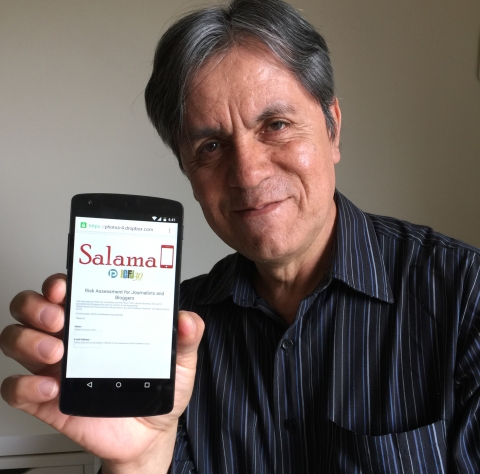
Knight Fellow Sierra created an app to help journalists assess their risks—and improve their safety.
During his ICFJ Knight Fellowship, security expert Jorge Luis Sierra is creating applications to help reporters assess their physical and digital risk.
In an interview with ICFJ, Sierra talks about Salama, a risk-assessment app he’s building that will help journalists and bloggers work more safely.
How does the app work?
Salama was inspired by years of observation of journalists who were attacked because, among other reasons, they covered sensitive stories in risky areas without adopting security protocols or procedures. This app helps journalists and bloggers assess their risk level by asking the user a series of questions about their security. Depending on their answers, they are rated on a scale of 20 to 100 – 20 indicating low risk and 100 meaning their risk level is extremely high.
Based on their answers, the app also provides immediate feedback on what they can do to improve their security. This includes links to online manuals, tutorials and other training material I’ve developed over the years as a Knight Fellow.
Why did you decide to create the app?
Two years ago, I created and conducted a similar online survey to gather data that would help journalists measure their levels of risk. In the process of analyzing the answers and providing feedback to participants, I found one particular challenge: I was taking days, sometimes weeks, to determine the scores and send a message to every journalist who had answered the survey. So I started to think about asking a developer to help me write code for the survey to produce an automated response, depending on each individual score. This way, I could immediately help the journalists who took the survey and provide them with advice.
I found an excellent partner in the PeaceTech Lab, whose specialist Derek Gildea has been so enthusiastic in helping me to develop the automated response. The result of this collaboration is Salama.
When is it launching?
Over the past few months, I have worked to enrich the app, including detailed answers, training resources and advice for users. Once this is done, it will be translated into Arabic and Kurdish, and we will launch a version in Iraq, in partnership with the PeaceTech Lab, the Iraq Foundation and the Iraqi Journalists Rights Defense Association.
While it’s still in the beta testing phase, I have used Salama to conduct risk assessments among journalists and bloggers from Brazil, Colombia, Guatemala, Honduras, Mexico and Nicaragua.
In Mexico, I produced risk assessments for journalists in Guerrero and Veracruz, two of the most dangerous states for media in that country. That included recommendations for governments and media companies to improve journalists’ security in those areas.
I also conducted full digital audits using Salama and other tools for two media organizations in Puebla, Mexico, and Mexico City. AristeguiNoticias.com in Mexico City was fully evaluated, and the team now uses digital security tools and platforms to protect their website. They also changed the newsroom’s editorial process to encrypt all communications.
Who will use this app?
Journalists, bloggers and human rights defenders can use this app, as well as members of civil society who are using the Web and digital tools to provide valuable information for citizens. You can access the app on any computer, tablet or mobile smartphone, regardless of its operating system.
How did you choose the name Salama?
Salama is an Arabic word that means "safe," "safely" or "in a safe manner." It's what people say to others when they are leaving on a trip. Salama is a one-word, easy-to-learn, sticky name for an app.
What are your next steps?
We’ve already created partnerships with organizations including Equalit.ie, the Information Safety & Capacity Project, the International Women's Media Foundation and the PeaceTech Lab. Next we will launch the app, create new partnerships, visit the countries where it will be used and train journalists and bloggers to make sure they take advantage of this new tool.